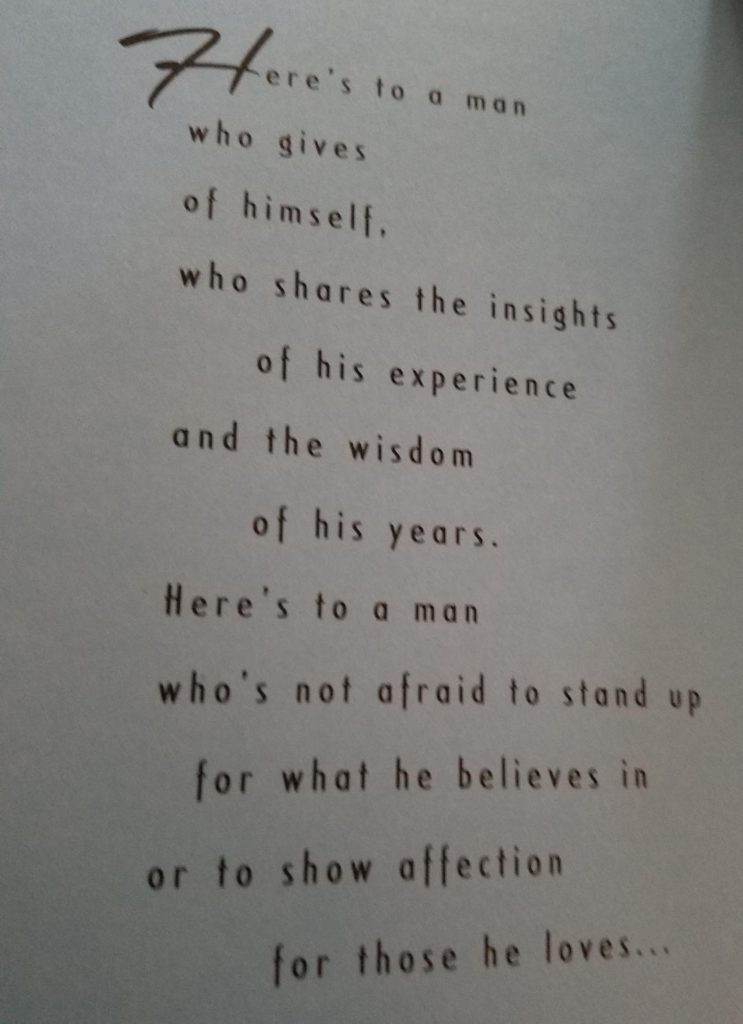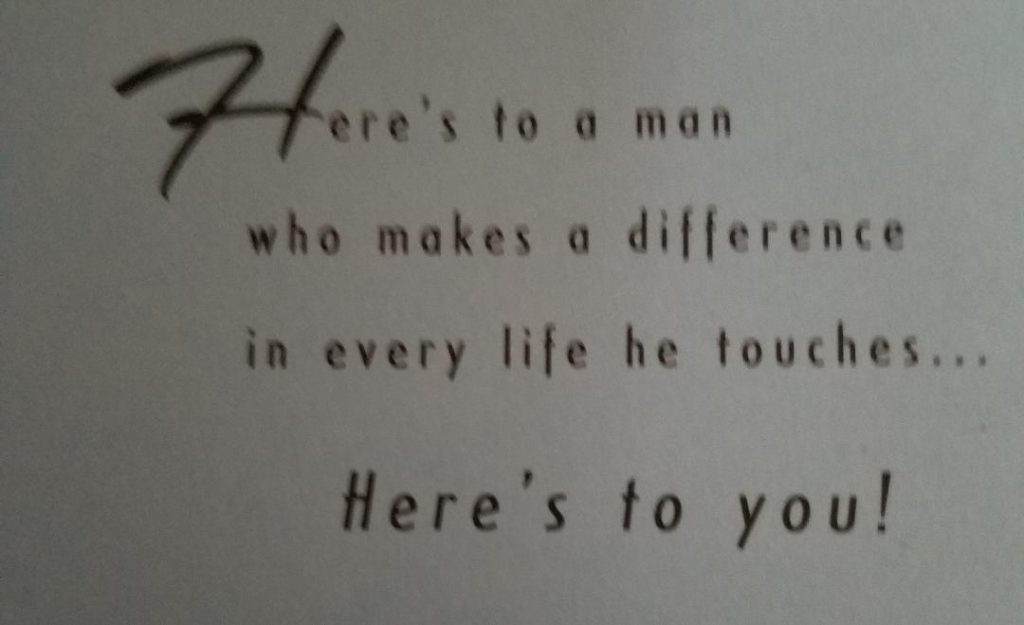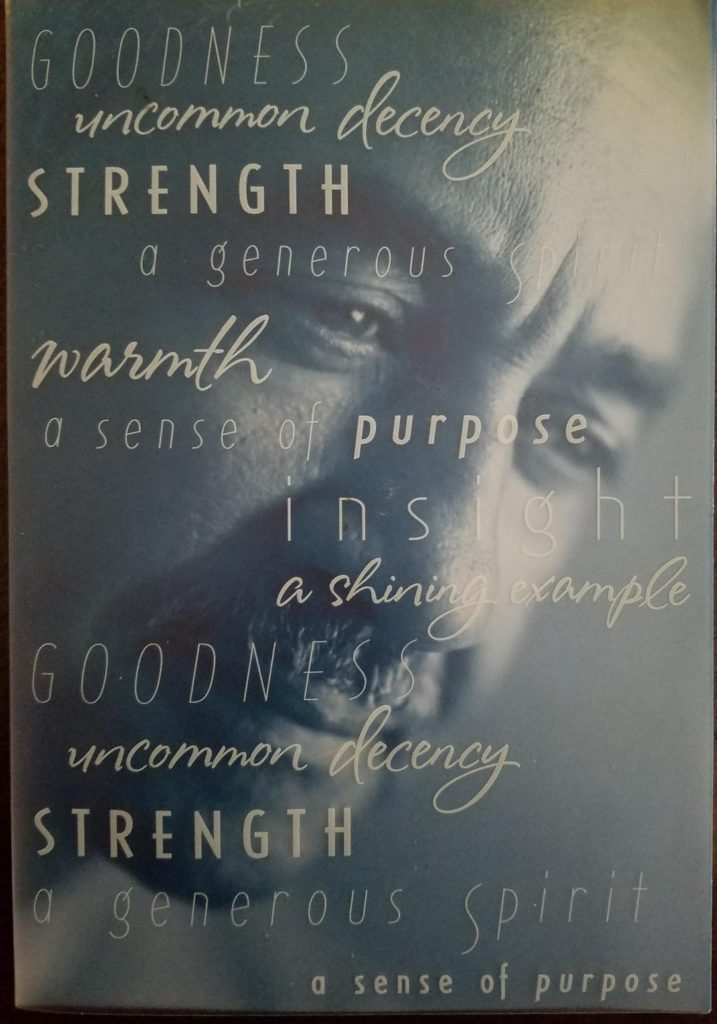I am a person who does not believe entirely in statistics. I believe statistics has a purpose, but God has a higher purpose. I grew up in absolute poverty. According to statistics, my family and I would repeat the poverty cycle. We all broke the chains of poverty. I was raised in a two parent household with parents who encouraged and supported us. We had positive people in our lives. MaDear and Dad were our rock. They raised us with kindness, disciplined us with love, reflected God’s love in their everyday living, and taught us how to survive and thrive in any environment. According to statistics, my sister Vie and I would be teenage mothers. We were both married when we had children. My sister was caring and I aspired to be like her. While she was ill, she encouraged me to finish college so I could succeed in life. Aunt Nora provided positive encouragement in the letters she wrote and Cousin Fessor provided positive encouragement in person. They all left a powerful impact upon me. They have all passed from this life but left a legacy of an abundance mentality that I can carry forward to future generations.
At a young age, I was a divorced mother with two children under age three. My girls Melody and Shelby, graduated college, got married, and have careers. I am very proud of the women they became. My oldest daughter met a wonderful man, got married and is now the parents of our precious granddaughter. My youngest daughter met a wonderful man, got married and enjoyed traveling and playing with their fur baby. After my children were grown, I married a wonderful Christian man who was not ashamed to show his love for God and Jesus. He was divorced and raised his two daughters to adulthood. He was honored to be a father figure to my girls. He loved and respected them and they loved and respected him. As a family, we’ve been through many battles, struggles, heartaches and difficulties. Through it all, God gave us the strength and resilience to continue.
Prior to being married, I was godmother to Kia, a spirited young lady I met through work. She, her husband and young son moved from out of state. They were an interracial couple and were adjusting to living in a southern state. This young loving family was welcomed in our work family with open arms. Kia’s mother passed away years ago and she shared that her father was an alcoholic. There was something special about this young lady and we were immediately drawn to each other. My husband was known as Big O. After meeting my husband she began calling him Dad. He was honored to be her father figure also. He took on the father role and provided nurturing and loving guidance. Kia and her husband called us their spiritual God Parents. We were honored to wear this title. Some years later, Kia wrote a book about her life. Eventually she became a minister and started a non-profit organization to help survivors of abuse and human trafficking. She and her husband were community advocates, served the homeless, and mentored to countless young women and men. I was honored to serve for twelve years on the board of directors for their wonderful organization. They went through many battles, struggles, heartaches and difficulties. God gave them the strength and resilience to continue.
After marrying Big O, I gained another beautiful daughter, Tina, her husband, and four young grandchildren. Big O’s oldest daughter passed away unexpectedly years ago at a young age. She was the mother of three children and Tina had one child. Tina adored her father and he was a true “Girl Dad.” Tina began calling me Ma and the children began calling me Grandma. They accepted me right away and I accepted them. Big O didn’t believe in the word step-children. We became a large, loving, blended family. As a family, we’ve been through many battles, struggles, heartaches and difficulties. God gave us the strength and resilience to continue.
Nine years after we married, Big O was diagnosed with a terminal illness and he was given a life expectancy of six months. As a nurse, I knew this was an estimate given based on previous data and does not always reflect true longevity. As a wife this was a difficult and painful diagnosis to hear and understand. We were supposed to grow old together and sit on the front porch rocking in matching rocking chairs. When he told us about his diagnosis, Tina and I sat with him around the kitchen table, teary eyed and scared of our own emotions. He listened to our concerns and fears and comforted us. He calmly and lovingly told us that he was not afraid. He was clear that he wanted to live a quality life as normal as possible. He reminded me of a sermon our pastor preached “Live until you die and don’t die while you’re living.” He was going to continue to enjoy his life to the fullest.
After much discussion and prayer, I finally understood my husband’s strong faith in Christ. As a family, we supported him and grieved in silence. He completed his living will and advance directives. Our human emotions had taken over, and he knew he needed to show us how to join him on his faith walk. He taught us that true faith is confidence that God will see you through. We knew he was a man of God and did not live for things of this life but for things of eternity. He told me that when it was his time, he prayed that God would take him quickly and he believed He would.
My husband was one of the strongest men I knew. He had a strong faith in God, strong family values and was a protector of his family. We started the difficult grief process while he was living. Instead of letting the disease overtake him, he used to say “I’m a War Horse”. He said, “God may not heal me but I know that He can and that’s good enough for me.” He reminded us that we were born to die. What matters is what we do while we are living. He told me that his joy was discovering what God put him on this earth to do. Our relationship got stronger and my life changed. Over the years, I searched for my purpose. I didn’t realize I was searching in the wrong places.

Big O was born with a congenital heart condition but you would never know it by the way he lived his life. He enjoyed life to the fullest. He said he knew his body better than anyone because he lives in it every day. As a child and adult, he lived an active life. He said his parents were told that due to his congenital heart condition, he would not live to see adulthood. He said he chose to stay positive and believed that he could accomplish anything. He chose to box, train for martial arts, and play sports. He chose life! Big O was a friendly man who loved people. He grew up quickly and survived in the streets. For many years, he said he struggled with managing his anger. He spent most of his young life getting into fights. He was not a big man in statue but earned the name Big O because he did not let anyone define who he was. He was described as a man’s man. As an adult, he chose to minister to young men who lived or were still living a street life. This was his purpose.
Sometimes when we hear devastating news we may wonder why we have to suffer. We learned that Christians should stop wondering why we suffer but consider how we respond to suffering. Based on my husband’s diagnosis and medical opinion his life expectancy was limited. While my husband was living with a terminal illness, my faith got stronger. Big O was never depressed and continued to enjoy life to the fullest. He continued his normal activities and insisted I continue mine. We prayed together, continued to laugh together and enjoyed the time God had blessed us with. Throughout our marriage we enjoyed long conversations that always seemed to short. All his doctors were puzzled by his longevity. He continued to trust God and said he was ready whenever God said it was his time.
Two years after he was first diagnosed my beloved husband passed away quickly, just as he asked God. We were heartbroken to lose our beloved Big O but very grateful to God for the favor given to us prior to his death. The doctors said no more than six months, but God gave us two years. We are never prepared for the death of our loved ones, but we were grateful for the time God gave us. We grieved hard but appreciated the time we had to spend with him. We loved on him more, laughed out loud, communicated more and spent quality time together.
Grief is an integral part of our experience as humans. It is a natural process. It may be a difficult process to go through. The first step to peace is to understand the complete grief definition. Bereavement is the process you go through after a loved one dies. There is no time period for how long you mourn. Each person mourns differently. According to information from grief support counselors, grief is a complicated experience that involves various emotions and for a time can affect your thinking, behavior, physical well-being and basic beliefs and assumptions about life.
Research indicates acute grief either passes or becomes complicated grief. Complicated grief happens when your ability to move through the grieving process is prolonged by maladaptive behaviors, obsessive thoughts, and uncontrollable feelings. This grief is more intense. It may be necessary to seek help from a professional grief counselor to accept the reality of loss and readapt to a new situation or lifestyle.
I believe that my husband would want me to share part of his testimony to help others. He shared his part while he was living and we joined him in his faith walk. He would want others to become stronger in their faith walk. He always said that he was a “War Horse.” I learned from my husband that War Horses go through many battles, struggles, heartaches and difficulties. God gives us the strength and resilience to continue. He never questioned why people suffer. He showed us how people of faith respond to their suffering. True faith can weather any storm. He was a War Horse!
We were devastated again when we were told approximately a year later that my youngest daughter’s husband had a terminal illness. Like my husband, he was given a life expectancy of a few months and lived beyond that time. They were living out of state. Fortunately his family moved to the same state a few years before and lived nearby. My oldest daughter, her husband, granddaughter, niece and her husband made many trips to support them and share in his faith walk. He continued to live a quality life. We were comforted knowing he made a peaceful transition. We were able to support them in grief. Years later, my daughter met another wonderful man who was divorced, remarried and gained a young daughter in love. She still travels frequently and we share my fur grand dog who is has become my constant companion. According to statistics our chances of getting married again were slim to none.
According to statistics, my three brothers, Tippy, Lil Bro, and Rom would be incarcerated. Instead, they are all veterans and two had careers in law enforcement. Beginning with Dad, the men in my family were “War Horses” and I honor them. They did not back down from adversity. As a result of struggles, grief, heartaches and difficulties in our family, we all learned to be “War Horses.”

I learned that there is no right or wrong way to come to terms with death or to grieve. People grieve differently. It was helpful for me to provide emotional and spiritual support by being present, being a willing listener, and being supportive. It was import to always stay open to new possibilities. Many terminally ill people choose to continue to live life to the fullest. Some may want to talk about their lives. Some may be in denial and this may be their way to cope. The reality may be to frightening or overwhelming. Ask them what they want and help meet their needs. Sometimes our loved ones may think they need to hang on for us. Let them know it is okay to let go. As a caregiver, don’t neglect yourself. Take breaks, eat balanced meals, and accept help from others. We have to understand that we may not be at our loved ones side when they transition. We can’t time when the transition will occur. We can get comfort in knowing that we honored their wishes and provided comfort. Guilt may occur after our loved ones transition, and we may start thinking we didn’t do enough. This is a part of the valley of grieving and will eventually fade away. At times, it may be necessary to seek help from a trained counselor. If your grief affects your ability to function, it may be necessary to seek professional help.
We have to take care of our mind, body and spirit.
